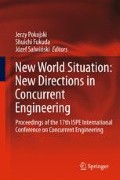Abstract
With the demand of globalization, the opportunities for collaboration became more evident with the effect of enlarging business networks. In such conditions, a key for enterprise success is a reliable communication with all the partners. Therefore, organizations have been searching for flexible integrated environments to better manage their services and product life cycle, where their software applications could be easily integrated independently of the platform in use. However, with so many different information models and implementation standards being used, interoperability problems arise. Moreover, organizations are themselves at different technological maturity levels, and the solution that might be good for one, can be too advanced for another, or vice versa. The work presented in this paper responds to the above needs proposing a framework for model language independent P2P mappings on a need-to-serve basis for interoperability of complex business networks.
Access this chapter
Tax calculation will be finalised at checkout
Purchases are for personal use only
References
Watson S. Material offshore sourcing undergoes standardization. SCBIZ Mag. April–May 2008.
Agostinho C, Jardim-Goncalves R. Dynamic business networks: a headache for sustainable systems interoperability. In: Proceedings of the confederated international workshops and posters on: on the move to meaningful internet systems: ADI, CAMS, EI2N, ISDE, IWSSA, MONET, ontocontent, ODIS, ORM, OTM Academy, SWWS, SEMELS, Beyond SAWSDL, and COMBEK 2009.
Jardim-Goncalves R, Agostinho C, Malo P, Steiger-Garcao A. Harmonising technologies in conceptual models representation. Int J Prod Lifecycle Manag. 2007;2(2):187–205.
Camarinha-Matos L, Afsarmanesh H. Collaborative networked organizations: a research agenda for emerging business models. Berlin: Springer; 2004.
Amin A, Cohendet P. Architectures of knowledge: firms, capabilities, and communities. Oxford: Oxford University Press; 2004.
INTEROP NoE. DI.2. Enterprise Interoperability-Framework and knowledge corpus-Advanced report. INTEROP NoE public Deliverable; 2006.
Roca de Togores A, Agostinho C, et al. Handbook: Improving interoperability in furniture SME’s using funStep standard-based solutions. 2008, INNOVAFUN–EC INNOVA Project No.: 031139, Deliverable 2.4; 2007.
Berre A-J, Liu F, Xu J, Elvesæter B. Model driven service interoperability through use of semantic annotations. In: International conference on interoperability for enterprise software and applications. China; 2009.
MDI. http://www.modelbased.net/mdi/. Accessed on 15th March 2010.
Selic B. The pragmatics of model-driven development. September/October IEEE Softw Mag. 2003.
MDA Guide Version 1.0.1. OMG. Document number: omg/2003-06-01 edn. 2003.
Grangel R, Bigand M, Bourey JP. A UML profile as support for transformation of business process models at enterprise level. MDISIS 2008.
D’Antonio F. Deliverable MoMo.2—TG MoMo Roadmap. InterOP 2005.
ATLAS. http://www.eclipse.org/m2m/atl/. Accessed on 15th March 2010.
MOF 2.0 Query/View/Transformation 1.0. OMG document number: formal/08-04-03.
Xpand Language. http://www.eclipse.org/modeling/m2t/. Accessed 15th March 2010.
Object Management Group: Object Constraint Language 2.2. OMG document number: formal/2010-02-01 (2010).
Bézivin J, et al. First experiments with the ATL model transformation language: Transforming XSLT into XQuery. In: OOPSLA 2003 Workshop, California.
Unified Modeling Language. http://www.uml.org/. Accessed on 15th March 2010.
Fuentes-Fernández L, Vallecillo-Moreno A. An introduction to UML profiles. In: UPGRADE, vol. V, no. 2, April 2004.
Agostinho C, Sarraipa J, D’Antonio F, et al. Enhancing STEP-based interoperability using model morphisms. In: 3rd International conference on interoperability for enterprise software and applications (I-ESA 2007).
Wimmer M, Seidl M. Model transformation with ATL. In: 1st International workshop, France, 8–9 July, MtATL 2009.
Object Management Group (OMG). Reference Metamodel for the EXPRESS Information Modeling Language, Version 1.0, Beta 3. November 2009.
W3C OWL 2 Web Ontology Language. http://www.w3.org/TR/owl2-syntax/. Accessed on 15th March 2010.
W3C XML Schema Definition Language (XSD) 1.1. http://www.w3.org/TR/xmlschema11-1/. Accessed on 15th March 2010.
ISO 10303-11. Industrial automation systems and integration. Product data representation and exchange. Part 11: The EXPRESS language reference manual; 1994.
Lubell J, Peak RS, Srinivasan V, Waterbury SC. STEP, XML, and UML: complementary technologies. In: DETC 2004, ASME 2004.
International Organization for Standardization (ISO). http://www.iso.org/iso/en/aboutiso/introduction/index.html. Accessed on 15th March 2010.
Jardim-Goncalves R, Grilo A. Putting the building and construction industry in the Single European Information Space. In: Automation in Construction 2009. doi:10.1016/j.autcon.2009.11.009.
Jardim-Goncalves R, Grilo A. Value proposition of interoperability on BIM and collaborative working environments. In: AUTOCON, Special issue; 2009.
Jardim-Goncalves R, Sarraipa J, Agostinho C, Panetto H. Knowledge Framework for intelligent manufacturing systems. Int J Intell Manuf 2009.
Schrage M. Shared minds. New York: Random House; 1990, p. 140.
Author information
Authors and Affiliations
Editor information
Editors and Affiliations
Rights and permissions
Copyright information
© 2010 Springer-Verlag London Limited
About this paper
Cite this paper
Agostinho, C., Correia, F., Jardim-Goncalves, R. (2010). Interoperability of Complex Business Networks by Language Independent Information Models. In: Pokojski, J., Fukuda, S., Salwiński, J. (eds) New World Situation: New Directions in Concurrent Engineering. Advanced Concurrent Engineering. Springer, London. https://doi.org/10.1007/978-0-85729-024-3_12
Download citation
DOI: https://doi.org/10.1007/978-0-85729-024-3_12
Published:
Publisher Name: Springer, London
Print ISBN: 978-0-85729-023-6
Online ISBN: 978-0-85729-024-3
eBook Packages: EngineeringEngineering (R0)

